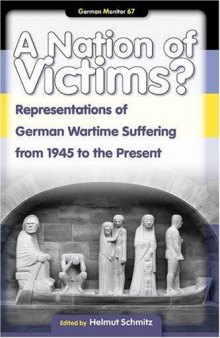 جزییات کتاب
جزییات کتاب
The re-emergence of the issue of wartime suffering to the fore of German public discourse represents the greatest shift in German memory culture since the Historikerstreit of the 1980s. The (international) attention and debates triggered by, for example, W.G. Sebald's Luftkrieg und Literatur, G??nter Grass's Im Krebsgang, J?¶rg Friedrich's Der Brand testify to a change in focus away from the victims of National Socialism to the traumatic experience of the 'perpetrator collective' and its legacies. The volume brings together German, English and Israeli literary and film scholars and historians addressing issues surrounding the representation of German wartime suffering from the immediate post-war period to the present in literature, film and public commemorative discourse. Split into four sections, the volume discusses the representation of Germans as victims in post-war literature and film, the current memory politics of the Bund der Vertriebenen, the public commemoration of the air raids on Hamburg and Dresden and their representation in film, photography, historiography and literature, the impact and reception of W.G. Sebald's Luftkrieg und Literatur, the representation of flight and expulsion in contemporary writing, the problem of empathy in representations of Germans as victims and the representation of suffering and National Socialism in Oliver Hirschbiegel's film Der Untergang. Table of Contents** Introduction:** Helmut SCHMITZ: The Return of Wartime Suffering in Contemporary German Memory Culture, Literature and Film** 1. The Post-War Period** Gregor STREIM: Germans in the Lager. Reports and Narratives about Imprisonment in Post-War Allied Internment Camps** Hans-Joachim HAHN: 'Die, von denen man erz?¤hlt hat, dass sie die kleinen Kinder schlachten.' Deutsche**Leiderfahrung und Bilder von Juden in der deutschen Kultur nach 1945. Zu einigen Texten Wolfgang Weyrauchs** Helen WOLFENDEN: The Representation of Wehrmacht Soldiers as Victims in Post-War German Fi



 دانلود کتاب
دانلود کتاب

 جزییات کتاب
جزییات کتاب

 این کتاب رو مطالعه کردید؟ نظر شما چیست؟
این کتاب رو مطالعه کردید؟ نظر شما چیست؟
